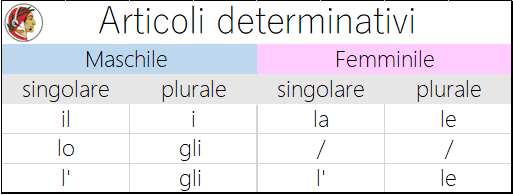Italian articles are of 2 types: determinativi (definite) and indeterminativi (indefinite)
All Italian articles agree in gender and number with a noun. There are 2 genders in the Italian language: maschile (masculine) and femminile (feminine) and they can be singular or plural.
- The articolo determinativo, in Italian, is used to introduce nouns which refer to specific items. They are equivalent to the English “the“.
- Same for the articolo indeterminativo, equivalent to the English “a” referring generically to an object.
Depending on the gender and number of the object they describe, articles change.
For example, we can say, La casa è grande, the house is big, using the article LA, singular feminine, because the noun casa is singular feminine. We are clearly referring to a specific house, because LA is an articolo determinativo. The house.
If we say, Vorrei una casa grande, I’d like a big house, we use the article UNA, singular feminine. In this case we need to use UNA, articolo indeterminativo, just “a” house.
Let’s see them all in detail.
Articoli determinativi
Articoli determinativi maschili – Masculine Definite Articles
il and its plural i are the most used
- il cane, i cani
Lo, and its plural Gli are exceptions, used in the following cases: masculine nouns beginning with: a vowel, s + consonant, z, gn, ps, pn.
- L’amico, Gli amici
- Lo studente, Gli studenti
- Lo zaino, Gli zaini
- Lo gnocco, Gli gnocchi
- Lo psichiatra, Gli psichiatri
- Lo pneumatico, Gli pneumatici
The first case, masculine noun beginning with a vowel, is by far the most common case where we need Lo (L’) and Gli. S + consonant and Z are pretty common, the last three are rare, so don’t worry too much.
A classic example is lo spazio, gli spazi. In case of a vowel we use L’amico
Articoli determinativi femminili – Feminine Definite Articles
Feminine articles, are less complicated. We have la singolare and le plurale.
- La casa, Le case
In case of a noun beginning with a vowel we use L’ because of the smoother sound.
- L’amica, Le amiche
Articoli indeterminativi
Articolo indeterminativo maschile UN, is by far the most used, for all masculine nouns beginning with a vowel or a consonant
- Un amico
- Un cane
Articolo indeterminativo maschile UNO, not used together with nouns beginning with a vowel (uno amico —> un amico). Other that that, it matches the cases valid with “Lo”: s + consonant, z, gn, ps, pn:
- Uno studente
- Uno zaino
- Uno gnocco
- Uno psichiatra
- Uno pneumatico
Articolo indeterminativo femminile UNA, is used for all feminine nouns, except when they begin with a vowel, in which case we use the truncated form UN’. So, we can say una casa, but un’amica , a female friend:
- Una casa
- Un’amica
Please take your time, solve the quiz below and repeat the correct sounds. A presto.
LOADING QUIZ...









